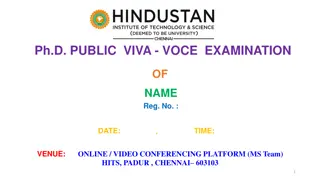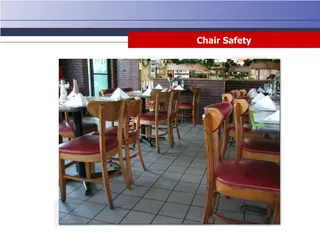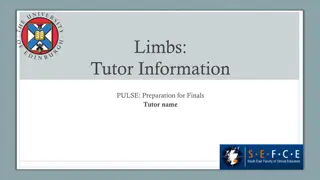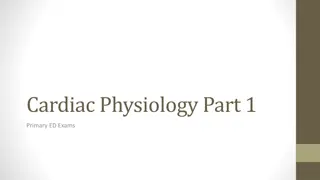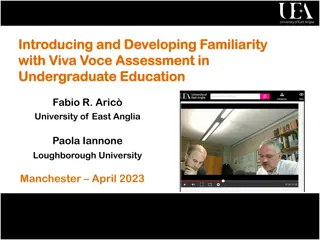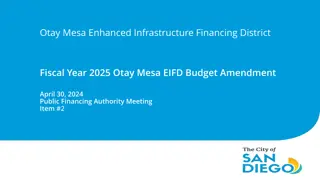
Importance of Independent Viva Chairs in PGR Examinations
Discover the crucial role of independent viva chairs in PGR examinations, recommended by QAA and UoL regulations. Learn why having examination chairs ensures fairness, adherence to regulations, effective communication, and reduces appeals or complaints related to examination conduct.
Download Presentation

Please find below an Image/Link to download the presentation.
The content on the website is provided AS IS for your information and personal use only. It may not be sold, licensed, or shared on other websites without obtaining consent from the author. If you encounter any issues during the download, it is possible that the publisher has removed the file from their server.
You are allowed to download the files provided on this website for personal or commercial use, subject to the condition that they are used lawfully. All files are the property of their respective owners.
The content on the website is provided AS IS for your information and personal use only. It may not be sold, licensed, or shared on other websites without obtaining consent from the author.
E N D
Presentation Transcript
Why have examination chairs? Recommended by the QAA as good practice; UoL regulations an Independent Chair must be present at all vivas Viva chair should ensure fairness; keep to time; adhere to regulations; communicate between entities Avoid appeals or complaints related to the conduct of the examination
PGR Regulations A.9.7 An Independent Chair, appointed by the CRDB, must be present at all vivas. Their role includes ensuring: (a) fairness in the way it is conducted; (b) that the University s regulations are adhered to; (c) that the outcome of the oral examination is appropriately communicated to both the student and the relevant entities in the University. The Independent Chair is not expected to read the thesis, make any contribution to its evaluation at any stage or to contribute to the academic judgment on the outcome of the oral examination.
PGR completion and examination forms PGR Intention to Submit PGR Examiners and Viva Chair PGR Thesis Submission PGR Examiners Initial Report on Thesis PGR Examiners and Chairs Reports on Thesis and Viva PGR Examiners Approval of Thesis Amendments PGR Confirmation of Award
Key paperwork for viva PGR Examiners Initial Report on Thesis Can include an initial recommendation and areas for discussion in viva PGR Examiners and Chairs Reports on Thesis and Viva Examiners and chair complete and sign this after viva All paperwork returned to CRDB (normally via School/College Office)
Who can chair an examination? It is recommended that independent chairs should have: Experience of supervising research degrees to completion; Experience of examining at the same degree level being examined (as internal or external examiner); It is a requirement that No involvement in supervision of the student; Attended a briefing session (and thus added to the list of trained examination chairs on Doctoral School site).
Appointing an Independent Chair Chair proposed (with examiners) on PGR Examiners and Independent Chair form by School Formally appointed by CRDB The chair is usually an internal member of staff from a different school; not necessarily a specialist in the subject Some Colleges moving to CRDB nomination of chair.
Before examination PGR Administrator will coordinate with chair and examiners regarding: Distribution of thesis and forms to examiners Time, date and location (cc:supervisor and student) Copies of PGR Examiners Initial Report on Thesis from each examiner Provide information on any special needs Chair checks room is appropriate for viva on the day (temperature, water, chairs, table, etc)
How many in the room? Normal 1 Student candidate 1 Independent viva chair 2 Examiners (internal plus external) or 3 Examiners for staff candidates (2 externals plus internal) Additional Observers and/or supervisor (with student s permission) Special needs support if required
Paperwork on the day. Ideally viva chair should have PGR Examiners Initial Report on Thesis form completed by each examiner PGR Examiners and Chairs Reports on Thesis and Examination to complete Copy of regulations Details of special needs of the student Date of next CRDB exam board
Pre-meeting with examiners The chair will normally attend the pre-meeting of internal and external examiners to: Brief examiners on regulations and processes Facilitate the development of an agenda Discuss with examiners the possible outcomes Can also discuss which examiner will review revisions (if amendments required) which examiner will collate comments and the composite list for the student after viva
During the examination At beginning, put the student at ease and explain the roles of every one present and the process Ensure that any supervisors or observers are only present at the same time as the student and sit in appropriate places in the room Position yourself discretely in the room to observe the process, but not to interfere with it Ensure that regulations and policies are adhered to and that the examination is conducted fairly As required, facilitate decision by reference to university regulations
What might make an examination unfair? Use of discriminatory or threatening language / behaviour by the examiners or student Overly aggressive questioning Behaviour by the examiners (or student) that violates university policies e.g. on equality, disability, diversity Examiners not making sufficient effort to take account of the needs of the student (e.g. where their first language is not English)
Intervening The chair should normally stay silent during the course of the examination, but may intervene if they have concerns Intervention could involve suspending the proceedings briefly and speaking to the examiners (or student) separately In exceptional circumstances the chair may need to terminate the examination, and then provide a report to CRDB on the reasons why
After the examination Only chair and examiners present, but chair does not take part in examiners deliberations Agree outcome (including if this is undecided and referred to CRDB) If any corrections: Agree main ones Determine plan to create agreed list (e.g. examiners communicate directly, and send to School PGR Administrator within a few days). Record plan on form Have PGR Examiners and Chair Report on Thesis and Examination form completed/signed and pass on to School/College PGR Administrator.
Outcomes of First Viva Award with no corrections May include small number of typographical errors. Minor amendments. Up to 3 months to correct, normally only subject to internal examiner reassessment (6 months for PT students) Substantive amendments Up to 6 months to correct, often internal and external reassessment (12 months for PT students) Re-examination with or without viva (see later) Lower award (e.g. MPhil), possibly with amendments. No Award & no re-examination For split decisions, examiners complete separate reports for CRDB to assess
Re-examination Re-examination normally involves resubmission of thesis and second viva, but can be viva only or resubmission without viva PhD and MPhil The student shall submit the thesis for re-examination no later than 10 months from the date of notification by the CRDB (20 months part-time) Viva should take place within 4 months of re-submission. .
Re-examination outcomes Award with no corrections May include small number of typographical errors. Amendments Up to 3 months to correct for full-time students & 6 months for part-time Nominate examiners to collate/approve amendments Lower award (e.g. MPhil; assuming conditions met) No award. Undecided where examiners do not agree. CRDB decides if further examiner and possible re- examination required Regardless, all final decisions rest with the CRDB
Informing students post-exam Post-examination, examiners (or chair) should indicate to student: Recommended outcome If any, main corrections (and that detailed ones will be forthcoming in writing) Who will approve corrections How to indicate changes (e.g. highlight changes in red, and indicate these in a separate document) Indicate timelines (e.g. for corrections), and that these times are from notification date of CRDB Emphasise, final outcome rests with the CRDB
Follow-up actions Where corrections required, School/College PGR Administrators will, in writing: Inform student of initial outcome Provide student with list of corrections (and timeline) Forward any revised thesis to appropriate examiners Forward revised decision to CRDB For other decisions, following the CRDB, Student Administration will inform students of the outcome (including details on the complaints and appeals process)
Potential problems Chair does not turn up Postpone examination Examiner does not turn up Postpone examination But, if still 2 examiners and 1 is external ask CRDB chair to continue Alternative copies of thesis Examine the thesis originally submitted. Examiners can not agree Note difference of opinion and refer to CRDB to arbitrate. Record any problems and resolution on PGR Examiners and Chair Report on Thesis and Examination form.
Useful sites PGR Office See portal under Registry for blank PGR forms, guides and links to regulations https://ps.lincoln.ac.uk/services/registry/Assessments/PGROffice /SitePages/Home.aspx Doctoral School On portal homepage for registers of trained/approved supervisors and independent chairs http://doctoralschool.lincoln.ac.uk/ PGR Regulations on Secretariat blog https://secretariat.blogs.lincoln.ac.uk/university-regulations/


